
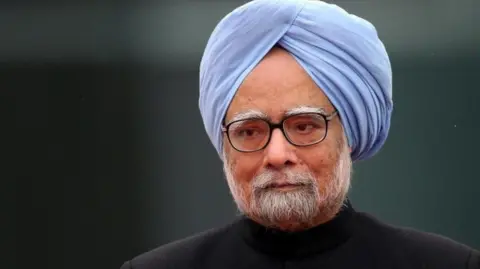 Getty Images
Getty ImagesFormer Indian Prime Minister Manmohan Singh has died at the age of 92.
Singh was one of India's longest-serving prime ministers and was considered the architect of major liberal economic reforms, as prime minister from 2004 to 2014 and before that as finance minister.
Reports stated that he was transferred to a hospital in the capital, Delhi, after his health condition deteriorated.
Singh was the first Indian leader since Jawaharlal Nehru to be re-elected after serving a full first term, and the first Sikh leader to hold the highest office in the country. He made a public apology in Parliament for the 1984 riots in which about 3,000 Sikhs were killed.
But his second term was marred by a series of corruption allegations that dogged his administration. Many say the scandals were partly responsible for the Congress Party's crushing defeat in the 2014 general elections.
Singh was born on September 26, 1932, in an abandoned village in the Punjab province of undivided India, which lacked water and electricity.
After joining the University of the Punjab, he obtained a master's degree from the University of Cambridge and then a doctorate in philosophy from the University of Oxford.
While studying at Cambridge, a lack of funds troubled Singh, and his daughter Daman Singh wrote in a book about her parents.
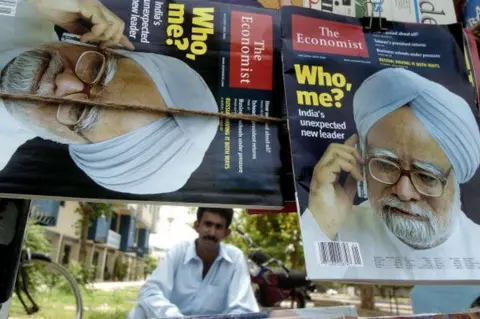 Getty Images
Getty Images“His tuition fees and living expenses amounted to about £600 a year. The Punjab University Scholarship gave him about £160. For the rest he had to depend on his father. Manmohan was careful to live very miserly. Subsidized meals in the dining hall were available relatively cheap at two shillings and sixpence “
Daman Singh recalled her father being “completely helpless at home and could not boil an egg nor turn on the television.”
Consensus builder
Singh rose to political prominence as India's finance minister in 1991, taking office as the country was sinking into bankruptcy.
His unexpected appointment was the culmination of a long and illustrious career as an academic and civil servant – he worked as an economic adviser to the government and became Governor of the Reserve Bank of India.
In his first speech as Minister of Finance, he quoted Victor Hugo's famous saying: “No force on earth can stop an idea whose time has come.”
This served as the starting point for an ambitious and unprecedented economic reform programme: he lowered taxes, devalued the rupee, privatized state-run enterprises, and encouraged foreign investment.
The economy rebounded, industry revived, inflation was controlled, and growth rates remained consistently high into the 1990s.
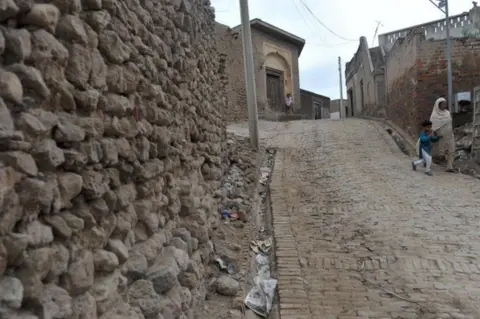 Getty Images
Getty Images“Accidental Prime Minister”
Manmohan Singh was a man keenly aware of his lack of political base. He once said: “It is nice to be a statesman, but to be a statesman in a democratic country you must first win the elections.”
When he tried to win elections to the Indian Parliament in 1999, he was defeated. Instead, he sat in the Senate chosen by his Congress party.
The same thing happened in 2004, when Singh was appointed prime minister for the first time after Congress leader Sonia Gandhi declined the position – apparently to protect the party from damaging attacks because of her Italian origins. But critics claimed that Sonia Gandhi was the real source of power when he was Prime Minister and that he was never in charge.
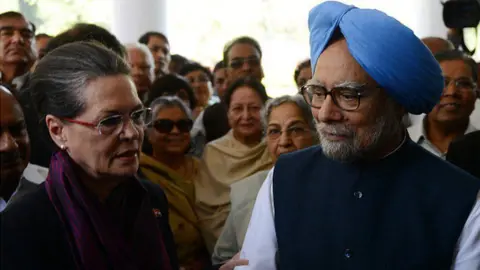 Agence France-Presse
Agence France-PresseThe biggest victory during his first five-year term was to bring India out of nuclear isolation by signing a historic agreement guaranteeing access to American nuclear technology.
But the deal came at a price, as the government's communist allies withdrew their support after protesting against it, and Congress was forced to make up the lost numbers by rallying support from another party amid accusations of vote-buying.
As a consensus builder, Singh presided over a coalition of regional allies and supporters who were at times difficult, assertive, and perhaps unruly.
Although he earned respect for his integrity and intelligence, he was also known for being soft and indecisive. Some critics claimed that the pace of reform had slowed and he had failed to achieve the same momentum he had when he was finance minister.
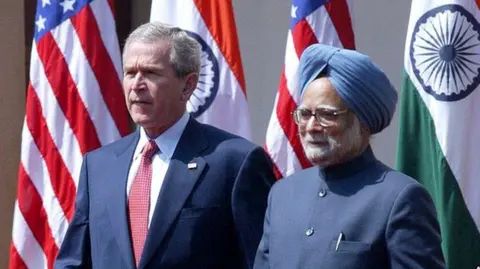 Agence France-Presse
Agence France-PresseWhen Singh led the Congress to a decisive second victory in the 2009 elections, he pledged that the party would “rise to the occasion”.
But the luster soon began to fade, and his second term was in the news mostly for the wrong reasons: several scandals involving his cabinet ministers that allegedly cost the country billions of dollars, the disruption of parliament by opposition, and major political paralysis. Which led to a serious economic contraction.
LK Advani, a senior leader in the rival Bharatiya Janata Party, described Singh as “India's weakest prime minister.”
Manmohan Singh defended his record, saying his government had worked with “utmost commitment and dedication for the country and the well-being of its people.”
Pragmatic foreign policy
Singh adopted the pragmatic foreign policies of his predecessors.
He continued the peace process with Pakistan – although this process was hampered by attacks blamed on Pakistani militants, culminating in the Mumbai gun and bomb attack in November 2008.
He tried to end the border dispute with China, and brokered a deal to reopen the Nathu La corridor to Tibet, which had been closed for more than 40 years.
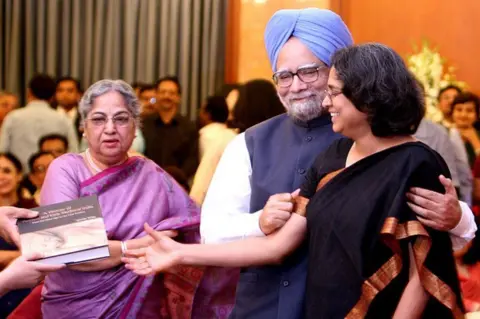 Getty Images
Getty ImagesSingh increased financial support for Afghanistan and became the first Indian leader to visit the country in nearly 30 years.
He also angered many opposition politicians when he appeared to end relations with Iran, India's old ally.
Low level leader
A hard-working academic and former bureaucrat, he was known for being self-effacing and always keeping a low profile. His social media account was noticed mostly for lackluster entries and had a limited number of followers.
A man of few words, but his calm demeanor has won him many admirers.
In response to questions about the coal scandal involving the illegal allocation of multibillion-dollar licenses, he defended his silence on the issue by saying it was “better than a thousand answers.”
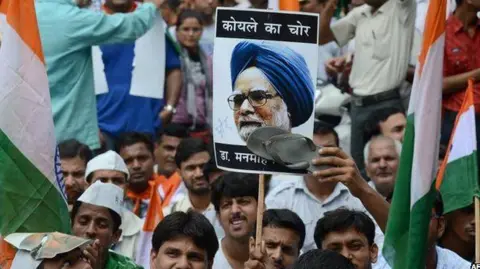 Agence France-Presse
Agence France-PresseIn 2015, he was summoned to appear in court to answer allegations of criminal conspiracy, breach of trust and corruption-related offences. An upset Singh told reporters that he was “open to legal scrutiny” and that “the truth will prevail”.
After taking over as Prime Minister, Singh remained deeply involved in the issues of the day as a senior leader of the main opposition Congress party despite his advanced age.
In August 2020, he told the BBC in a rare interview that India needed to take three steps “immediately” to stem the economic damage from the coronavirus pandemic, which has pushed the country's economy into recession.
He said the government needs to provide direct cash assistance to people, make capital available to businesses, and reform the financial sector.
Singh will be remembered in history for successfully bringing India out of its economic and nuclear isolation, although some historians may suggest that he should have retired earlier.
“I honestly believe that history will be kinder to me than the contemporary media, or the opposition parties in parliament,” he said in a 2014 interview.
Singh is survived by his wife and three daughters.









